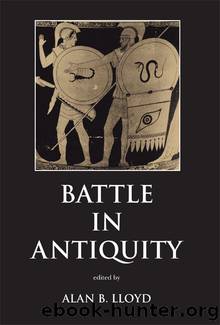Battle in Antiquity by Lloyd Alan B

Author:Lloyd, Alan B. [Lloyd, Alan B.]
Language: eng
Format: epub
Tags: COOKING / General
ISBN: 9781905125272
Publisher: Classical Press of Wales
Published: 2009-10-01T05:00:00+00:00
Homosexuality and the efficiency of the fighting force
Having reviewed the evidence for military homosexuality, and having attempted to account for a partial dearth in evidence for something we have reason to believe did exist, we are now in a position to consider a question consonant with the main theme of this volume: Did homosexuality in Greek armies make them more cohesive, efficient fighting forces? Some scholars have argued that it did, particularly in the cases of Sparta and Crete.258 But the evidence is far too scant for a definitive answer, and far too many other unquantifiable factors, for which we can not control, obviously contributed importantly to efficiency. But what we can do is investigate some theoretical possibilities, suggested by the Greek evidence itself, for the effects of homosexuality on Greek armies; ultimately then we are not answering the question at a truly sociological level, but merely at the level of what the Greeks themselves believed.
At a superficial level, it is clear, particularly from Plutarchâs writings on Thebes and the theoretical assertions of Plato and Xenophon,259 that the Greeks did believe, in general, that homosexual relations within or around an army improved its efficiency. Leaving aside Spartaâs custom of physical valour-insemination, we learn from Plutarchâs account of the Theban army that it was precisely the homosexual relationships within the Sacred Band that made it such a superlative force. In this account homosexuality is elevated to the position of tactical principle: posting lovers side by side is joked by Pammenes to be a better tactic even than Nestorâs hallowed advice to marshal clan by clan and tribe by tribe; and the soundness of the tactic is vouched for by the approval of the greatest of all tacticians, Philip. And it is further argued that when pairs of lovers are concentrated together in the same unit, the effect of the whole is greater than the effect of the sum of the parts; this effect is seen in terms of an extrapolatable natural principle, comparable to a phenomenon observable in chariot teams.
Loving couples are said by Plutarch to be brave for two reasons: firstly, because they have the highest interest in protecting the body of the one they love; and secondly because they are ashamed to be disgraced by cowardliness before the one they love, and therefore compete with their fellows to appear to be the bravest (Greek agonism again).260 It is presumably this last factor that is supposed to create the âbooster effectâ of concentrating pairs of lovers together in the same unit: competition with other competitive pairs will be fiercer than that between a single loving pair and the non-paired men around them. However, it perhaps appears from Xenophonâs tale of Episthenes that a man could be inspired to display bravery not just before one special partner of his own, but also before a wider range of men he found attractive, and perhaps saw as potential partners. There could also be an element of competitiveness between the two members of a
Download
This site does not store any files on its server. We only index and link to content provided by other sites. Please contact the content providers to delete copyright contents if any and email us, we'll remove relevant links or contents immediately.
| Africa | Americas |
| Arctic & Antarctica | Asia |
| Australia & Oceania | Europe |
| Middle East | Russia |
| United States | World |
| Ancient Civilizations | Military |
| Historical Study & Educational Resources |
The Daily Stoic by Holiday Ryan & Hanselman Stephen(3297)
The Fate of Rome: Climate, Disease, and the End of an Empire (The Princeton History of the Ancient World) by Kyle Harper(3055)
People of the Earth: An Introduction to World Prehistory by Dr. Brian Fagan & Nadia Durrani(2726)
Ancient Worlds by Michael Scott(2678)
Babylon's Ark by Lawrence Anthony(2671)
The Daily Stoic by Ryan Holiday & Stephen Hanselman(2564)
Foreign Devils on the Silk Road: The Search for the Lost Treasures of Central Asia by Peter Hopkirk(2454)
India's Ancient Past by R.S. Sharma(2450)
MOSES THE EGYPTIAN by Jan Assmann(2411)
The Complete Dead Sea Scrolls in English (7th Edition) (Penguin Classics) by Geza Vermes(2269)
Lost Technologies of Ancient Egypt by Christopher Dunn(2219)
The Earth Chronicles Handbook by Zecharia Sitchin(2217)
24 Hours in Ancient Rome by Philip Matyszak(2075)
Alexander the Great by Philip Freeman(2064)
Aztec by Gary Jennings(2019)
The Nine Waves of Creation by Carl Johan Calleman(1906)
Curse Tablets and Binding Spells from the Ancient World by Gager John G.;(1858)
Before Atlantis by Frank Joseph(1847)
Earthmare: The Lost Book of Wars by Cergat(1817)
